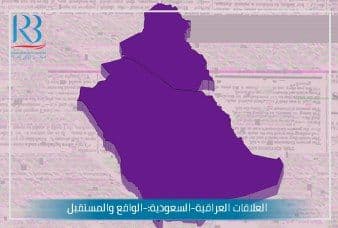 2021 / 27 / Mar
2021 / 27 / Mar
Iraqi-Saudi relations: reality and future
Mr. Dr. Jassem Younis Al-Hariri
Professor of political science and international relations
The importance of Iraqi-Saudi relations
Some may ask why the Iraqi-Saudi relations are considered pivotal, and of great importance in the Middle East region? In order to answer this important and vital question at the same time, it falls into several considerations, as follows: -
1. The regional strategic conflict:
The existence of a regional strategic conflict in the region between the Kingdom of Saudi Arabia, Iran and Turkey, and Iraq is one of the arenas of this conflict, and because of that, every country seeks to win Iraq over to it in order to secure its strategic depth.
2. The US-Iranian conflict:
There is a conflict between the United States of America and Iran over several files, the most important of which is the nuclear program, the missile program, and its influence in some countries in the region, including Iraq, and both countries seek to win over some other countries to their side, and isolate them from the other side.
3. Saudi Arabia's desire to withdraw Iraq to the Gulf region: -
Saudi Arabia seeks to promote the argument ((returning Iraq to the Arab Gulf incubator, in an effort to reduce the pace of Iraqi-Iranian relations, and to rectify the mistakes of distancing Iraq from its Arab-Gulf environment, which paved the way for Iran after 2003)), according to its vision.
4. Iraq's endeavor to open up to its regional environment:
Iraq has tried by all diplomatic means to open up to its regional surroundings, not to join, and entrench itself with any of the conflicting axes in the Middle East, and the neighboring countries realizing that Iraq has a strong economy, if it rearranges itself, great human power, and civilizational weight. All these facts make Iraq in the future an important regional power and an effective pole in the Middle East that has a great impact in resolving many issues.
The reasons for the deterioration of Iraqi-Saudi relations after 2003-2017
The deterioration of Iraqi-Saudi relations during that period can be attributed to several reasons:-
1. Saudi caution about the political process in Iraq:
The Kingdom of Saudi Arabia was wary of the democratic political process in Iraq, and accused the process of sectarianism for fear of a democratic, stable, and secure Iraq.
2. Fear of Shiite politicians:
Saudi Arabia was afraid of Shiite politicians, and saw them as loyal to its first enemy, Iran. According to that vision, it sought to destabilize Iraq by various means, including facilitating the infiltration of Saudi terrorists into Iraq to carry out suicide operations in populated areas, and the continuation of takfiri fatwas from the Wahhabi religious establishment that incites the killing of Iraqis from a certain sect (Shiites) of Iraqi society, launching various false accusations against them to justify their targeting, and supporting the ISIS terrorist organization's occupation of Mosul and the rest of the cities. The other Iraqi between 2014-2017.
3. Saudi Arabia appointed in 2015 Brigadier General ((Thamer Al-Sabhan)):-
Who had held the position of military attaché at the Saudi Embassy in Lebanon as its ambassador to Iraq, but Iraq asked the Kingdom in August 2016 to replace Al-Sabhan after a period of time as a result of a number of malicious statements regarding various issues such as the popular crowd, Iraq’s relationship with Iran, and the status of Saudi prisoners in Iraq, which the Iraqi government saw as statements that fuel sectarianism in Iraq, in addition to that they represent a blatant interference in Iraqi internal affairs, and indeed Saudi Arabia withdrew him, and appointed Brigadier General ((Abdul Aziz Al-Shammari)) as the Kingdom’s Chargé d’affaires in Iraq to succeed him For Sabhan.
4. The sectarian factor:
Saudi Arabia sees the Shiite sect in particular as an influential match for its internal situation and its religious leadership, as it fears its effects on the internal structure of Saudi Arabia as a religiously diverse people with a Sunni-Wahhabi majority. It also sees in it a competitor on the level of its leadership over the Arabs and Muslims, and the Saudi leaders assume that most of the Iraqi leaders are subordinate and loyal to their enemy, Iran, which has a Shiite majority, and sees them as a threat to the Kingdom and the Middle East as a result of Iran’s efforts to spread the Shiite sect opposed to the Wahhabi doctrine, and therefore those leaders must be dealt with caution.
Developments in Iraqi-Saudi relations after the liberation of Mosul 2017
After the liberation of Mosul and other areas in 2017, which were occupied by the terrorist organization ISIS, a qualitative development took place in the course of the Iraqi-Saudi relations, represented by the rush of Saudi Arabia towards Iraq to consolidate relations with it, and the prelude was given to it by the visit of ((Adel Al-Jubeir)), the Saudi Foreign Minister, to Iraq in February 2017, and he met with Mr. Haider Al-Abadi, the Iraqi Prime Minister. Hundreds of Saudi terrorists within the terrorist organization ISIS participated in many terrorist operations, which were mainly targeting population centers, mosques, and hussainiyas to stir up sectarian and ethnic strife among the Iraqi social fabric. In addition, the security forces found many cars sent from the adjacent borders with Saudi Arabia with Saudi numbers, and the identities belonging to dead soldiers, including Saudis, who fell into ISIS elements in the battlefields with the security forces, and thus Al-Jubeir’s visit was an urgent “reanimation dose” for the tension that was taking place. As a result of the negative Saudi intervention in Iraq. The Saudi elites at the time tried to put forward justifications for that visit. For example, but not limited to, Fayez Al-Shehri says in the Saudi newspaper, Al-Riyadh: “The political and economic support, the confrontation of terrorism, the right to neighbourhood, and the brothers form the basis of Saudi relations with its Arab brothers.
((Abdul Rahman Al-Tuwairi)) indicates in the Saudi newspaper ((Okaz)) that Al-Jubeir's visit ((is a step on the road to greater rapprochement between Iraq and its Arab depth)). A Kuwaiti newspaper believes that the aforementioned Saudi step brought the attention of Iraqi politicians, and they made it a new starting point for Iraqi-Saudi relations. Why? Because it represents ((transitioning the stagnant relationship between the two countries to a better level, it achieves two goals for Iraq, one of which is internal in terms of opening windows to the state of sectarian tension in light of the Iraqi need for a comprehensive political settlement in the Iraqi arena after the liberation of Mosul, and the other is Iraq’s desire for live openness across its Arab surroundings, as Saudi Arabia represents a wider gateway to achieve this desire)) (5).
The reality of Iraqi-Saudi relations
Important transitions took place in Iraqi-Saudi relations after 2020, which can be summarized as follows:
1. In May 2020, the American newspaper (Al-Monitor) published an important article by the Iraqi Prime Minister ((Mustafa Al-Kadhimi)) in which he emphasized ((that Iraqi-Saudi relations are the main key to problems and solutions to crises in the Middle East)), and Al-Kadhimi added ((that relations between Iraq and Saudi Arabia are not an option, but rather a strategic duty for the two countries, and work must be done to expand them to the deepest point)).
2. Prince ((Mohammed bin Salman)), the Saudi Crown Prince, held an (online) meeting with Mr. ((Mustafa Al-Kazemi)), the Iraqi Prime Minister, on 11/10/2020 via ((video conference)) during which the works of the fourth session of the Saudi-Iraqi Coordination Council were reviewed and the agreements and memorandums of understanding that resulted from the previous three sessions serve to strengthen relations between the two countries, and the approval of the results of the Council’s work in its fourth session and the conclusions of its committees. In a joint statement, the Saudi Crown Prince and the Iraqi Prime Minister affirmed ((the determination of the two countries to strengthen relations between them in all fields, and to move them forward in line with the aspirations and visions of the leaderships of the two countries in a way that achieves common interests, enhances the security and stability of the region, and advances the development wheel for the benefit of the two brotherly peoples and achieves their well-being)).
3. On the eighteenth of February 2021, Iraq announced its intention to open a new border crossing with the Kingdom of Saudi Arabia through the province of Al-Najaf, to be a window for cooperation, increase trade exchange, and facilitate the movement of pilgrims between the two countries after the Arar border crossing and Al-Jumaima, after a 30-year closure. In addition, the third crossing will add impetus to the growing economic relations between the two neighbors, and contribute to the revitalization of cities and governorates located on the roads leading to the crossing.
The future of Iraqi-Saudi relations
The foreseeable future could be within the next five years, extending to the year 2025, and falls within two main scenarios, as follows:
A- A scenario for the development of Iraqi-Saudi relations:
Iraqi-Saudi relations can develop towards better levels if there is a common political will that has a desire to move forward together to develop areas of cooperation between them. The interesting thing is that Saudi Arabia did not stop seeking to improve its relations with the Iraqi governments that successively ruled the country after 2003, starting with the assumption of ((Haider Al-Abadi)) as prime minister, and then ((Adel Abdul-Mahdi)) to the current government headed by ((Mustafa Al-Kazemi)), by activating many areas of cooperation that contributed to the development of brotherly relations between them, most notably the political, economic, investment, and diplomatic fields.
B- A scenario of strained Iraqi-Saudi relations:
This scenario could develop in the event that Saudi Arabia pursued provocative policies towards Iraq, and ((Nuri al-Maliki)) the former Iraqi Prime Minister revealed the nature of those policies by saying ((I was the first to visit Saudi Arabia, and I negotiated with it in the hope of turning the sectarian page, and opening a page in the way of improving relations, but US President Bush himself failed to improve Saudi Arabia’s relationship with Iraq because of the sectarianism of Riyadh)), and he explained ((The United States tried under former President George Bush to create a state of agreement for it between Iraq and Saudi Arabia, and Bush himself went to Saudi Arabia and could not solve the problems, so he asked me why They have this insistence on not solving it, so I said that the problem in the first place is sectarian, because they believe that Baghdad is the capital of the Abbasid caliphate and it is not permissible for it to be ruled by a Shia.

Mr. Dr. Jassem Younis Al-Hariri Mr. Dr. Jassem Younis Al-Hariri